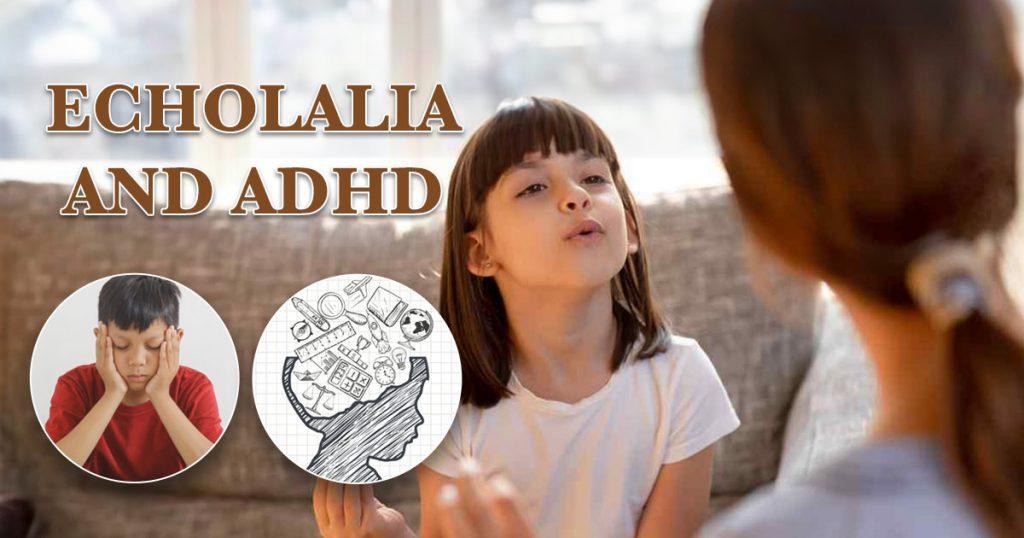Many people know about ADHD (Attention Deficit Hyperactivity Disorder) and its main signs like trouble focusing, being very active, and acting without thinking. But did you know that some people with ADHD might repeat words or phrases they hear? This is called echolalia. See how echolalia connects to ADHD, what it means, and whether it’s a symptom of ADHD.
What is Echolalia?
Echolalia is when someone automatically repeats words or phrases they’ve heard. This can happen right after hearing them or after some time has passed. The word “echolalia” comes from the Greek words “echo,” meaning to repeat, and “lalia,” meaning speech.
It’s normal for young children to go through a phase of echolalia as they learn to talk, usually outgrowing it by age three. However, in some older children and adults, especially those with certain developmental conditions, echolalia can continue.
Types of Echolalia
Echolalia can be divided into two main types:
- Immediate Echolalia: This happens when a person repeats something they just heard, usually within seconds. For example, if someone asks, “Do you want to go outside?” the person might respond by repeating, “Do you want to go outside?”
- Delayed Echolalia: This occurs when someone repeats phrases or sentences they heard a while ago, sometimes days or weeks later. For example, they might quote a line from a movie or a conversation they had earlier.
Echolalia can also be further broken down into:
- Mitigated Echolalia: This is when the repeated phrase is slightly changed to fit the current situation better.
- Unmitigated Echolalia: This is when the phrase is repeated exactly as it was heard, without any changes.
Is echolalia a symptom of ADHD?
Echolalia is usually linked with Autism Spectrum Disorder (ASD), but it can also appear in people with ADHD. However, it’s not a key sign of ADHD. In cases where echolalia is present in ADHD, it might be due to challenges like trouble paying attention, remembering things, or managing tasks. Speech and language issues aren’t used to diagnose ADHD, but some research shows that these problems are more common in children with ADHD.
Children with ADHD often struggle with impulsivity and inattention, which can impact how they develop language skills. They might repeat phrases they hear as a way to help themselves process information or stay focused during conversations. This behavior can act as a coping mechanism, especially when they’re feeling overwhelmed or having trouble communicating.
What causes echolalia in ADHD?
Echolalia in people with ADHD can happen for several reasons:
- Language Processing Difficulties: Children with ADHD might have trouble understanding language, leading them to repeat what they hear as a way to make sense of it.
- Attention Deficits: Paying attention is important for learning language. Kids with ADHD might struggle to focus on the meaning of words, which can cause them to repeat words or phrases.
- Sensory Sensitivity: Many people with ADHD are extra sensitive to sensory input. They might use echolalia as a way to cope with overwhelming sounds.
- Co-occurring Conditions: ADHD often exists alongside other conditions like Autism Spectrum Disorder (ASD). The combination of symptoms from both conditions can make echolalia more likely.
What are the symptoms of echolalia in ADHD?
Echolalia can show up in different ways in people with ADHD. Common signs include:
- Repetition of Questions: Instead of answering a question, the person might repeat it exactly as they heard it.
- Rehearsing Phrases: They might repeat certain phrases or sentences as a way to think out loud or get ready for a conversation.
- Using Intonation Patterns: The person might copy the tone and rhythm of the original speaker, which is another form of echolalia.
- Frustration in Communication: Children with echolalia might feel frustrated when trying to have conversations, as their repeated phrases don’t always lead to meaningful communication.
How to manage echolalia in ADHD?
Echolalia itself doesn’t need treatment, but managing ADHD symptoms can help with echolalia. Here are some treatment options:
- Behavioral Therapy: Techniques like Cognitive Behavioral Therapy (CBT) can help by addressing negative thoughts and behaviors that affect communication and impulsivity.
- Speech Therapy: Working with a speech-language pathologist can improve communication skills and teach better ways to express oneself.
- Medication: Sometimes, medication for ADHD can help manage symptoms and indirectly reduce echolalia.
- Supportive Strategies: Using alternative communication methods, like visual aids or written prompts, can help individuals communicate more effectively.
- Mindfulness and Relaxation: For those with internal echolalia ADHD, mindfulness techniques like deep breathing or meditation can help calm the mind and reduce the repetition of words in their head.
- Social Skills Training: Learning social skills can help people with ADHD manage echolalia in conversations. This training teaches how to interact with others in a way that reduces the need to repeat words.
- Adjusting the Environment: Creating a calm and structured environment can help manage echolalia. Reducing noise and distractions, using visual aids, and setting clear expectations can make communication easier.
Echolalia can happen to people with ADHD
Echolalia, which is repeating words or phrases, can happen in people with ADHD, even though it’s not a main sign of the disorder. It often helps them deal with focus issues or distractions. Though echolalia is more commonly linked with Autism Spectrum Disorder, it can also occur in ADHD due to problems with attention, language, or sensitivity to sensory input.
Managing echolalia involves treating ADHD symptoms with therapies, medication, and strategies to support communication. By addressing these underlying issues, people with ADHD can improve their communication and reduce the effects of echolalia.
